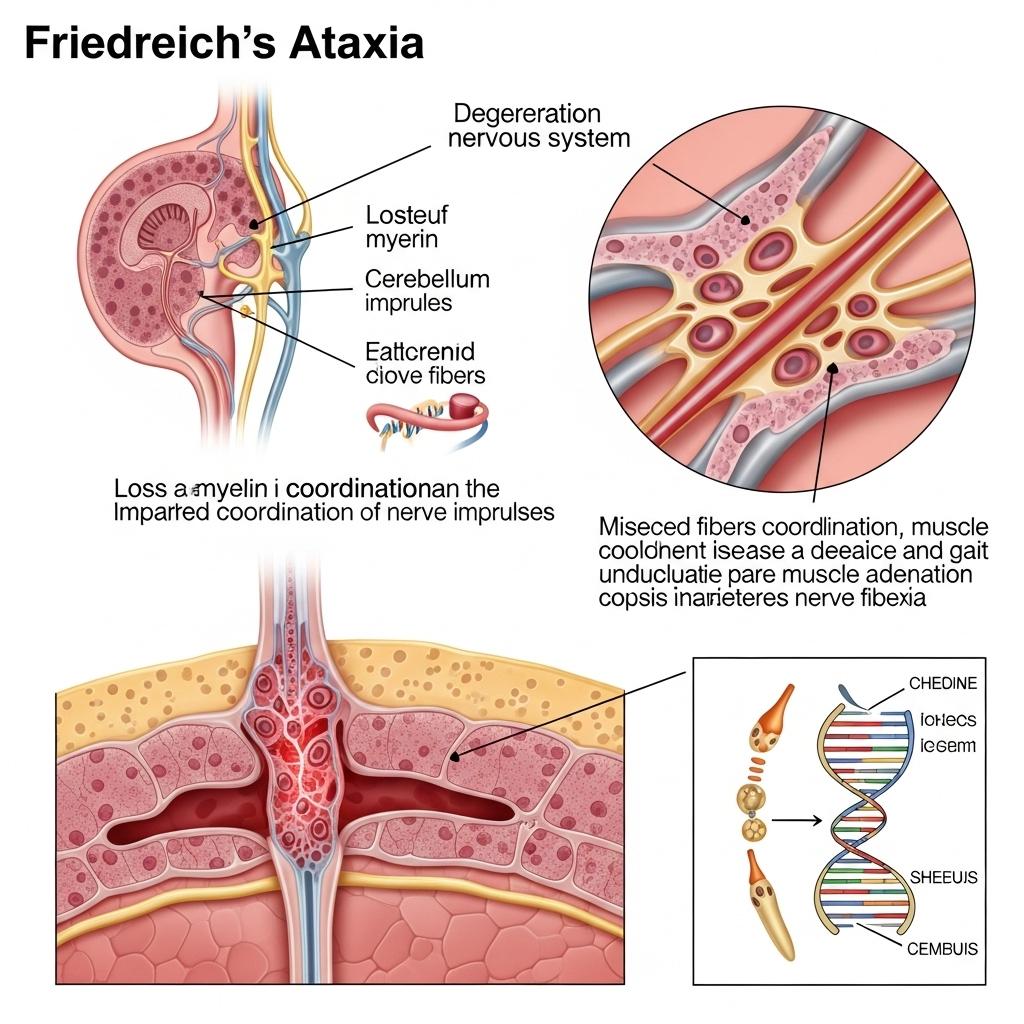Sponsor
Omaveloxolone and Beyond: Emerging Treatments in Friedreich’s Ataxia

Friedreich’s Ataxia (FA) is a rare, autosomal recessive neurodegenerative disorder that primarily affects the nervous system and the heart. Caused by mutations in the FXN gene, FA leads to decreased production of frataxin, a mitochondrial protein essential for iron-sulfur cluster formation and mitochondrial energy production. Its deficiency results in mitochondrial dysfunction, oxidative stress, and progressive degeneration of nerve and muscle tissue.
FA typically presents in childhood or adolescence, with early onset linked to faster progression and more severe outcomes. With no FDA-approved cure to date, advancements in gene therapy, mitochondrial-targeted ***s, and clinical biomarkers are offering new therapeutic hope.
Request a sample copy of the CI report at: https://www.datamintelligence.com/strategic-insights/ci/friedreichs-ataxia-disease-modifying-therapies-market-intelligence
Clinical Features: Early Manifestations and Multisystem Involvement
The hallmark features of Friedreich’s Ataxia include:
1. Progressive ataxia (loss of coordination)
2. Muscle weakness, especially in the legs
3. Loss of deep tendon reflexes
4. Dysarthria (slurred speech)
5. Scoliosis and foot deformities
FA also presents with serious non-neurological complications:
* Cardiomyopathy: Hypertrophic or dilated cardiomyopathy is common and a leading cause of mortality.
* Diabetes mellitus: Affects ~10-20% of individuals due to pancreatic beta-cell dysfunction.
* Hearing and vision loss: Can develop in advanced stages.
Onset before age 15 typically indicates a faster disease trajectory with earlier wheelchair dependence, while later-onset forms (LOFA) progress more slowly.
Molecular Basis and Diagnosis
FA is caused by GAA trinucleotide repeat expansions in intron 1 of the FXN gene. The repeat size inversely correlates with age at onset and disease severity.
Diagnosis involves:
* Genetic testing to confirm GAA expansion on both alleles
* Electrocardiogram (ECG) and echocardiography to monitor cardiac function
* MRI of the brain and spinal cord, showing atrophy in later stages
* Early genetic testing allows for family screening, genetic counseling, and enrollment into natural history studies or clinical trials.
Therapeutic Landscape: Current Strategies and Investigational Approaches
Currently, there are no disease-modifying therapies approved for FA, but supportive care and investigational therapies are rapidly advancing.
1. Symptomatic Management
Physical therapy and occupational therapy help maintain mobility.
Speech therapy and assistive communication devices support speech and swallowing.
Medications for spasticity and neuropathic pain offer symptomatic relief.
2. Cardiac and Metabolic Care
Regular monitoring and management of cardiomyopathy and arrhythmias.
Diabetes screening and treatment in individuals with glucose abnormalities.
Pipeline Innovation: From Energy Restoration to Genetic Correction
Several promising therapies are under clinical evaluation:
• Omaveloxolone (Skyclarys™ – Reata Pharmaceuticals)
A Nrf2 activator that improves mitochondrial function and reduces oxidative stress.
FDA-approved in 2023 for FA treatment in the U.S.
Shown to improve modified Friedreich's Ataxia Rating Scale (mFARS) scores.
• Gene Therapy (e.g., Lexeo, AAV-mediated)
AAV vectors aim to deliver functional FXN genes to the nervous system and heart.
Preclinical models have shown frataxin expression and phenotypic improvement.
• HDAC Inhibitors
Target epigenetic silencing of FXN due to GAA expansions.
***gned to increase frataxin transcription.
• Mitochondrial-targeted agents (e.g., RT001, MIN-102)
Focus on enhancing mitochondrial health and reducing reactive oxygen species (ROS).
Challenges in Care and Research
Barriers in managing FA include:
1. Delayed diagnosis, especially in cases with late onset or atypical symptoms.
2. Geographic disparities in access to genetic testing, physical rehabilitation, and specialized care.
3. Limited understanding of genotype-phenotype modifiers, which can impact therapy response and prognosis.
Natural history studies, international registries (such as the FA Global Registry), and adaptive trial ***gns are accelerating research.
Request a CI consultation at: https://www.datamintelligence.com/strategic-insights/ci/friedreichs-ataxia-disease-modifying-therapies-market-intelligence
Outlook: Moving from Symptom Control to Disease Modification
The development of biomarkers like frataxin protein levels, imaging tools, and digital mobility assessments is enhancing trial sensitivity and patient stratification. As *** development expands beyond symptom management, gene-targeted and neuroprotective strategies hold the promise of slowing or even halting progression in the coming decade.
About DataM Intelligence
DataM Intelligence 4Market Research LLP delivers real-time competitive intelligence across autoimmune, immunologic, and rare disease spaces. Our insights span clinical pipelines, regulatory benchmarks, and commercialization strategies for stakeholders in global life sciences.
🔗 Visit: www.datamintelligence.com






